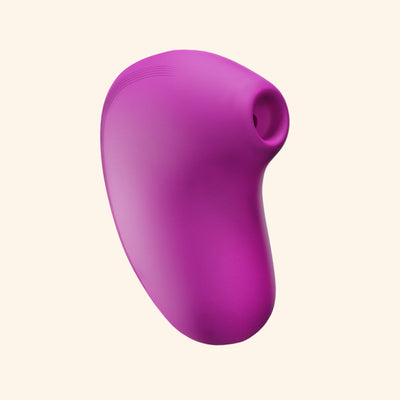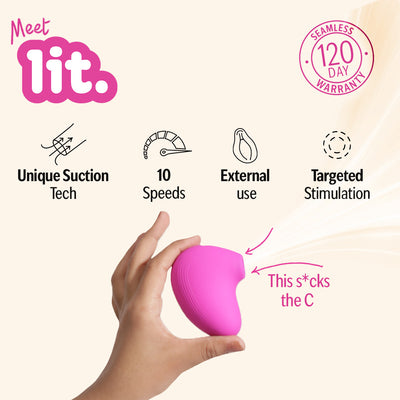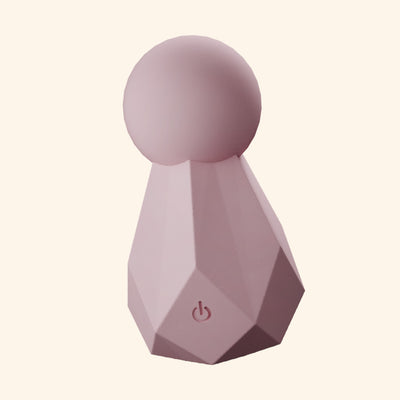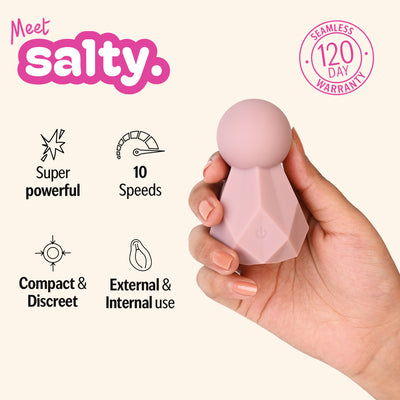Your cart is currently empty
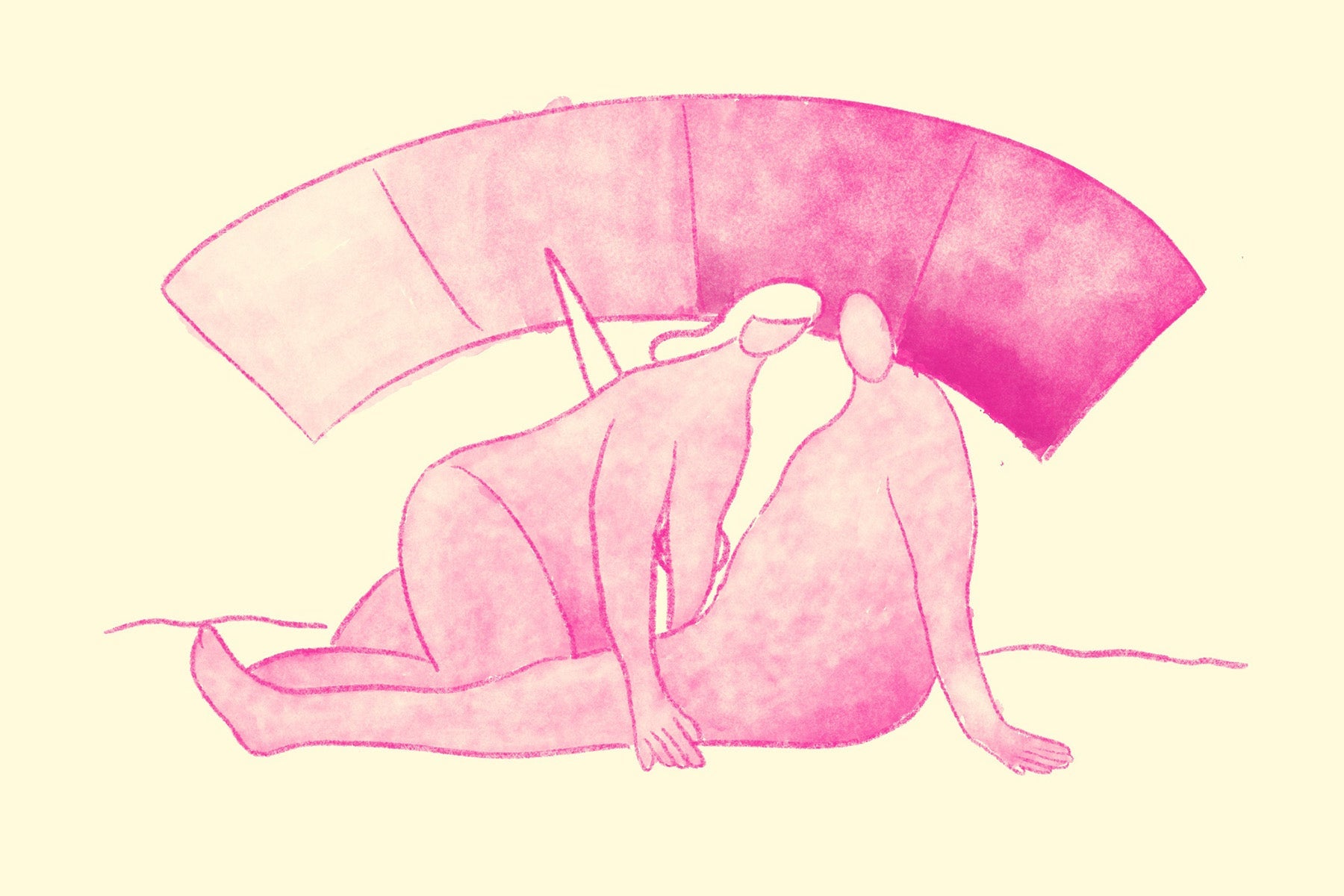
Have you ever wondered - why do some of your friends feel like they're always ready to go, while others aren't as keen on getting down and dirty? Why on some days you can’t wait to get into the sheets and on another, not so much? Well today, we're going to understand why all of this happens. Let’s look at your (and my) sex drive in a way like never before!

What is Sex Drive?
So, your sex drive, a.k.a. your 'libido,' is basically your vibe check for getting it on. It's like how much or how little you're feeling the urge for some sexy time or intimate fun. It's like your inner meter for wanting to get cozy and close with someone. We don't slap a number on it, but we do say that you have a high or a low sex drive.
Factors Influencing Sex Drive :
First up, hormones. Your levels of estrogen, progesterone, and testosterone are the big players here. More estrogen and testosterone? You might be feeling extra frisky. But hey, progesterone? It could pump the brakes a bit.
Then, there’s psychological factors. How stressed or anxious are you? How’s your mental health holding up? Any body image vibes throwing you off? All that stuff can seriously mess with your mojo.
Your physical health is a big deal too. The better you eat, the more you sleep, the more you’re ready to rock. But watch out for your meds—especially stuff like antidepressants (SSRIs), blood pressure meds, and birth control. They can seriously dampen your sex vibes.
Past experiences also have a big say. If you’ve been through sexual trauma or had bad experiences - it can tank your libido, and understandably so.
But here’s the kicker: none of these things work alone. It’s all about how these cocktail of factors interact with each other. Like, if you’re super stressed (psychological), it might mess up your hormones (biological) and drag your sex drive down even more. It’s all connected in this wild, complicated dance.
Female Sex Drive :
Alright, remember how we talked about estrogen and progesterone? They're the key players in the female sex drive. Now, these hormone levels and a bunch of other stuff in their bodies change depending on what stage of life they're in. So, how does all that jazz affect female sex drive?
Menstrual Cycle -
The menstrual cycle, which is like a 28-day rollercoaster, is split into different phases with major hormone vibes that impact your libido:
- Menstrual Phase (Days 1-5): Estrogen and progesterone hit rock bottom as your body sheds the uterine lining. A lot of gals feel less in the mood, thanks to cramps and low hormone levels.
- Follicular Phase (Days 1-13): Estrogen starts climbing up, peaking just before ovulation. This hormone boost can lift your mood and energy, making you feel more up for some action.
- Ovulation (Around Day 14): This is the prime time for sexual desire because estrogen and testosterone are at their highest, amping up your libido and making things flow smoothly.
- Luteal Phase (Days 15-28): Progesterone spikes to prep for a potential pregnancy while estrogen dips and then rises again slightly. The impact on your sex drive can be all over the place—some women feel a drop because of progesterone’s chill effects, while others might feel a bump during the second estrogen rise.

Pregnancy -
Pregnancy is another hormonal whirlwind that can seriously shake up your sex drive:
- First Trimester: Many women see a dip in libido thanks to nausea, tiredness, and those crazy hormonal shifts. There’s a high level of progesterone here, which can also lower sexual desire even further.
- Second Trimester: Estrogen and progesterone keep climbing, and blood flow to the pelvic area ramps up. Libido often spikes because you’re feeling more energized and comfy. Plus, that increased blood flow can make things extra sensitive and pleasurable.
- Third Trimester: Hormone levels stay high, but now you’re dealing with physical discomforts like back pain and swelling kick in. Sexual desire might take a hit due to these discomforts and fatigue. But hey, some women still keep their libido high or even notice a boost.
Menopause -
When menopause rolls in, estrogen and progesterone levels take a nosedive as the ovaries decide to clock out. Testosterone levels also drop. For many women, this can mean a decrease in sexual desire because low estrogen can bring on vaginal dryness and make things less comfy.
But here's the twist: some women actually find their libido goes up because they're done worrying about pregnancy or periods.
It's always a wild ride for my girls, regardless of the phase they’re in!
Male Sex Drive :
Men do not have these wildly different lifestages, but does that mean their libido stays the same through their life?

In Your 20s: Testosterone is usually on fire in your 20s, and so is your sex drive. But here's the scoop: you might also be stressing about sex because, let's be real, you're still figuring things out. So while you're totally ready to go, you might also be low-key stressing about performance.
In Your 30s and Early 40s: Testosterone keeps things pretty lit through your 30s and early 40s, keeping that libido high. But around 35, it starts to dip. Plus, the grind from work, family, and all those adulting responsibilities piles up, which can seriously kill the vibe.
Crossing 50s and Beyond: Ain't no reason to skip the fun after 50! However, erectile dysfunction becomes more common around this age. Plus, you might start dealing with age-related stuff like heart disease and high cholesterol, and the meds that come with them. All of this can mess with your sex drive, but hey, it doesn't mean you can't still have an awesome time.
So yeah, life's a journey, and so is the male sex drive!
Comparing Female and Male Sex Drives :
You’ve probably heard this one a million times: “Men are always down for sex, and women need to be in the mood.” Everyone has told you about how guys are always ready to go at the drop of a hat, while women need everything to be just perfect.
This has been society’s belief forever—men want sex more than women. And, yep, there’s been a ton of research backing this up, like studies from way back.
But here’s the thing: does sex drive really fit into these neat little boxes? “Not only is the idea that men have higher sex drives an oversimplified notion, but it’s really just not true,” says Sarah Hunter Murray, PhD, a marriage and family therapist and the author of Not Always in the Mood: The New Science of Men, Sex, and Relationships.
Social psychologist Roy F. Baumeister claimed in multiple studies that men are obviously hornier than women, “Every marker we could think of pointed to the same conclusion. Men think about sex more often than women do. Men have more sexual fantasies, and these encompass more different acts and more different partners. Men masturbate more than women, much more.”
But then, around the same time, the New York Times dropped an article by Daniel Bergen, saying that women’s sex drive is actually higher than men’s and that their sexuality is way more fluid. Bergen even went as far as to say women might not be suited for monogamy because of this.
So, who’s right? Turns out, the whole thing is way more complicated than a simple yes or no. Let’s dig in!
Do Men Always Want Sex?
Not really, fam. Our society gives dudes more freedom to openly talk about wanting sex, while young women are often told to keep their sexuality under wraps. This creates this idea that guys are always ready to go, but the truth is, they just have more room to express it.
Plus, there's the whole pressure of keeping up their 'masculinity' game. Being a guy often means not chatting about relationship stuff, stress, or the daily grind. They're supposed to keep up this happy-go-lucky vibe, which includes pretending they've got a super active sex life, even if that ain't the case.
Uff, the biased reporting across ages :
Here’s the scoop: in sexuality research, there’s a big ol' issue. Women might downplay things, and guys might hype them up, just to look good and fit into society’s thinking of how they actually should be. So those supposed huge differences between genders? They might not be so massive after all.
Are we really so different?
Guess what? Sex drive in women and men might not be so different after all. Recent research is flipping the script, showing us that how we measure sexual desire might be the real game-changer.
Women’s sex drive isn’t lower than men’s; it just has its own unique, ever-changing patterns. We’ve been looking at it all wrong. Instead of pitting women's desire against men's, let's totally rethink how we see sexual desire overall. Time to ditch those old-school comparisons and embrace the full spectrum of desire!
Enhancing and Balancing Sex Drive :
Alright, to boost your sex drive, first tackle whatever's dragging it down. Stressed out from a crazy work schedule? Taking a chill break from the grind sounds like a solid move.
And hey, the vibe in your relationship totally affects how much you're itching for some intimacy. If there are any hiccups, focus on sorting them out—talk it out or maybe bring in a therapist for backup. Even if things are smooth sailing, planning those epic date nights and carving out quality time together can seriously amp things up.
A pro tip: dive into the foreplay game. Seriously, better foreplay ramps up your craving for more action. So, go all in with touching, kissing, maybe throw in some fun sex toys—whatever floats your boat. It's all about setting the stage for a mind-blowing experience!
Guys, here's the deal: Pump up your testosterone game with regular strength training. And hey, don't sleep on zinc-rich foods like oysters, beef, and pumpkin seeds—they're like turbo boosters for your libido.
Ladies, let's boost those estrogen levels with phytoestrogen-rich goodies like soy and flaxseeds. And if discomfort during sex is cramping your style, water-based lubricants are about to become your new bestie. Oh, and those kegel exercises? They're like hitting the gym for your pelvic floor—super important!
But hey, keeping your whole lifestyle in check is key for keeping that libido top-notch, regardless of your gender . If a high libido is your priority - it’s time to put your cigarettes out and alcohol on the low. Eat well, get enough shut-eye, and stay active—your body's gonna love you for it.
If your desire feels like it's stuck in low gear despite all these tricks, it might be time to chat with a pro. Whether it's major changes after meds or surgery, or if your libido's causing serious relationship drama – that's when booking an appointment with a urologist, gynecologist, or sex therapist is the move. They'll dig deep and hook you up with the best ways to rev up your libido—maybe even throw in some hormone therapies if needed.
Remember, sometimes a little expert help can work wonders!

Before I go :
Now, armed with all this info, I can't leave without telling you how it impacts your relationships. Everyone's libido is different, so what if you have a high libido and your partner has a low one?
It's easy to think their lower libido means they're less attracted, but that's not always the case. Remember babe, your partner doesn't have to be ready to jump into the cozy sheets and get down every time they see you to genuinely be attracted to you. It's totally okay if they have lower sexual desire. If you feel that you need more sex - navigate this by talking to your partner about it, exploring self-pleasure together, or even seeking couples therapy together.
When it comes to enhancing your sexual experience, tools like vibrators, male stroker massager, and water-based lube can make a significant difference. Vibrators can be a game-changer in achieving higher sexual pleasure and satisfaction. Male strokers provide a unique and intense sensation that can elevate both solo and partnered experiences. Lubricants are crucial for reducing friction, making intimate activities smoother and more comfortable.
Now that I've shared everything I wanted to tell you about what revvs your beautiful loud libido engine, here's wishing you a high sex drive - XOXO
Also check out our blogs on - vaginal sex and unprotected sex.
FAQs on sex drive
How does female sex drive differ from male sex drive?
Men have a daily hormonal cycle, but women? Oh, they've got a daily cycle PLUS a monthly one (thanks, periods!). Pregnancy and post-pregnancy can throw more curveballs for women too. Compared to men's more stable sex drives that change over the years, women's libido is like a shape-shifter—constantly evolving and more complex.
What factors can affect sex drive in both males and females?
What you eat, how you sleep, and whether you're exercising - it all affects your mojo, regardless of gender. Plus, there's the psychological stuff—how stressed are you? Your mental health and emotional well-being are major players in the libido game. Bottom line: healthier body, happier sex drive.
What is a ‘normal’ libido?
Here's the deal: 'normal' is whatever feels right for you. Some folks are up for action every day, others prefer a weekly rendezvous, and some are cool with less frequent romps—or none at all. It's all about what rocks your boat.
Is it normal for sex drive to change over time?
Absolutely! Your body's a changing canvas, my friend. Hormones shift as you age, and life stages like pregnancy and menopause can throw libido for a loop. Embrace the changes, they're all part of the journey.
How can I improve my sex drive?
Take care of yourself inside and out. Eat well, exercise, and keep your mental health in check—it's all key to revving up your libido. Oh, and don't forget about your relationships—open communication and feeling close to your partner can really crank up the desire.
- - - - - - - - - -
Author Bio :

Hemali (she/her) is an explorer of the realms of sexuality, intimacy, and dating. She talks endlessly about the evolving landscape of feminist narratives on the big screen and makes you reanalyze the portrayal of women in mainstream culture. If you're looking for alternative conversation starters, take your pick from: Biryani, Art Fairs, or Spoken Word Poetry.
